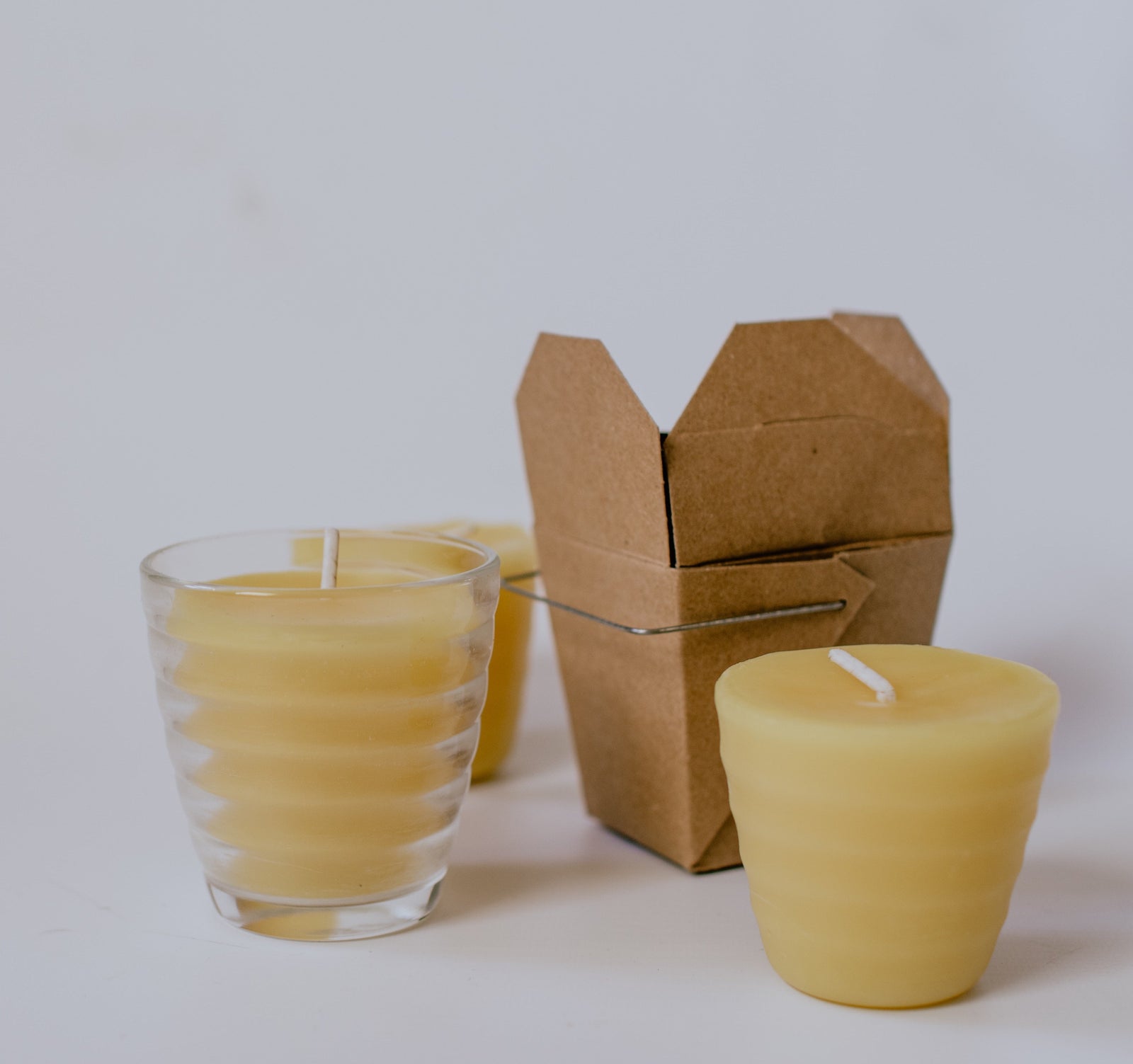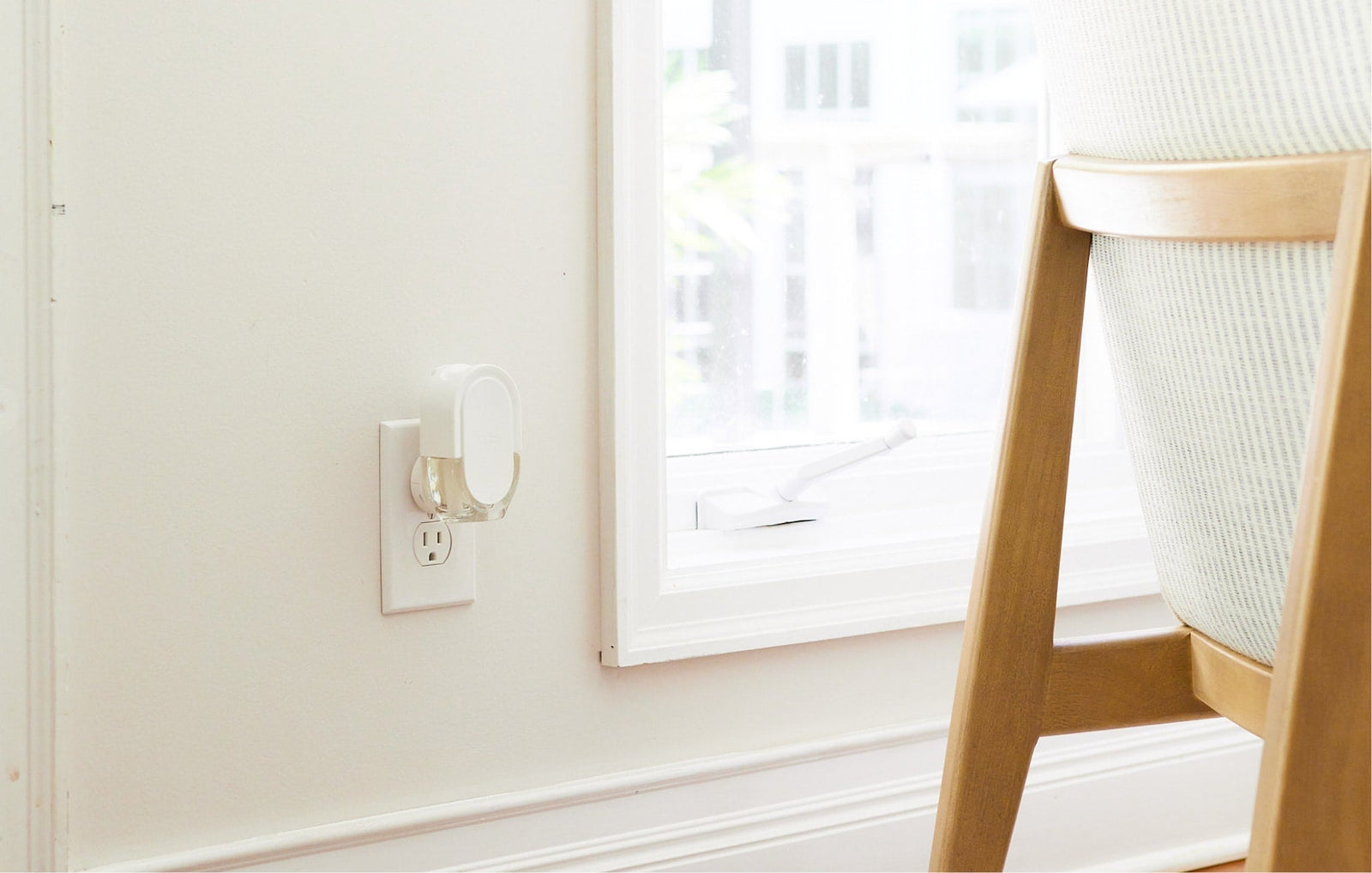How to Properly Care for Your Beeswax Candle

Candles are beloved for the cozy and pleasant ambiance they create. However, many conventional candles are made with chemicals and synthetic dyes that can negatively impact our health and indoor air quality.
To provide a healthier alternative, we crafted our Beeswax Candle that prioritizes human health, made of 100% beeswax with an organic cotton wick. This candle burns cleanly, producing minimal soot and no harmful emissions, making it the safest and healthiest option for your home.
In this article, we'll share our best tips for properly caring for your new beeswax candle, ensuring it performs at its best and lasts as long as possible.
Toss Conventional Candles
Our top tip is simple: ditch conventional and fragranced candles.
Most conventional candles are made from paraffin wax, and are processed with bleach, harmful carcinogens and then infused with toxic dyes and fragrances.
Synthetic fragrances, commonly labeled as “fragrance” or “parfum” on an ingredient list, are a concoction of hundreds of harmful chemicals. These chemicals are among the world’s top allergens and can pose serious health risks.
Even at room temperature, fragranced candles can release harmful volatile organic compounds (VOCs) like phthalates into your home. These phthalates are known endocrine disruptors, carcinogens, neurotoxins, asthmagens, and neurotoxins.
When these candles are burned, their effect worsens. They can emit formaldehyde, acetaldehyde, toluene, benzene, acetone, and other harmful substances, especially if the candles are dyed.
Removing conventional candles from the home can significantly reduce your exposure to harmful chemicals and improve the air quality in your home. Learn more about how removing fragrances from your space can boost your overall health.
Benefits of Beeswax
When we set out to create a healthy candle, the choice to use 100% pure beeswax was clear. Unlike traditional paraffin candles, which are derived from petroleum and can release harmful chemicals into the air, beeswax offers a cleaner, healthier alternative.
And beeswax candles do not only burn cleaner than paraffin counterparts (with little to no soot production), but they also last much longer. This means a consistent, gentle illumination without the risk of introducing pollutants into your home!
Lastly, beeswax naturally emits a subtle, sweet honey scent that enhances the space without added fragrances. We are all about a fragrance-free lifestyle at Branch Basics, so rest assured our candle does not have any added fragrances!
Tips to Properly Care for Your Beeswax Candle
#1: Allow for Proper Burn Time
When lighting your beeswax candle for the first time, allow it to burn until the wax pool reaches the edges of the container. This process, called “priming,” takes approximately 3 ½ hours the first time you burn your candle. It also helps to establish an even burn pattern.
It's important to note that beeswax candles, especially those made with 100% pure beeswax like the Branch Basics candle, are a natural product that can burn a bit differently than other types of candles.
Due to the nature of beeswax, which is denser and harder to melt, the candle may not always burn its full width right away. It can take longer for the wax to warm and reach the edges of the candle, particularly with shorter burn times. However, the longer you let your beeswax candle burn, the more optimal the burn width becomes, increasing the likelihood of it reaching edge to edge.
It’s also normal for the wax not to melt perfectly evenly, leaving an uneven surface, but this is a natural characteristic of pure beeswax.
After your initial burn, try not to burn candles for shorter than 3 ½ hours at a time. Like we said, the longer you let your beeswax candle burn, the more optimal the burn width becomes!
Also, always ensure wick is upright before lighting, and not pointed to the side. This will help the flame burn straight up.
#2: Trim the Wick

Before each burn, trim the wick to ~¼“, just enough to remove the burnt mushroom top. This helps to prevent excessive smoking and ensures a clean, even burn. A trimmed wick also minimizes the risk of the candle producing too large of a flame, which can cause dripping and uneven melting.
#3 Avoid Drafts
Place your beeswax candle away from drafts and air currents. Drafts can cause the flame to flicker and burn unevenly, leading to dripping and wasted wax. Optimal placement ensures a steady, consistent burn and prolongs the life of your candle.
#4 Extinguish Safely
Do not blow on the candle to extinguish it.
When it’s time to extinguish your beeswax candle, do so by using a fire-safe/metal tool to push the lit wick in the wax pool (silverware works great!). After extinguishing the flame in the wax, return the wick upright.
We also recommend putting the wooden top back on your candle directly after it is fully extinguished and cooled. Proper extinguishing helps maintain the integrity of the candle for future use.
#5 Store Properly
Store your beeswax candles in a cool, dry place away from direct sunlight. Excessive heat can cause the wax to soften or melt, while sunlight can fade the natural color of the candle. Storing your candles properly ensures they remain in optimal condition until their next use.
#6 Clean Occasionally
If your beeswax candle develops soot or debris on the surface, gently wipe it with a soft cloth. Placing the wood lid back on your candle after use is a great way to avoid dust collection.
A clean candle not only looks better but also burns more efficiently!
#7 Reuse & Recycle
Once your beeswax candle has burned down completely, consider reusing or recycling the container. We love using our leftover containers for bobby pins, flowers, pencil holders, extra coins and more!
Additional Reminders
Candles are a great way to provide a calming ambience but it is essential to use them safely. Always burn the candle within sight, away from flammable items and keep away from both children and pets.
Beeswax burns differently than any other wax and changes composition depending on what the bees are pollinating from. No two candles will burn the same. They may burn unevenly at times, but that’s the nature of beeswax.
Proper care is essential for maintaining the beauty and longevity of your beeswax candles. By following these simple tips, you can enjoy their warm, natural glow for many hours to come.
Let the radiance of beeswax candles illuminate your home and enhance your well-being!
Need another? Looking for a beautiful, healthy gift for a loved one? Stock up on your favorite Beeswax Candle!
Related Reads
Categories

Marilee Nelson
Marilee Nelson is an Environmental Toxins expert who has spent nearly 30 years advocating for the chemically-sensitive and chronically-ill. She is a Board Certified Nutritionist, Certified Bau-Biologist and Bau-Biology Inspector and specializes in Food As Medicine. She has helped thousands of families and individuals identify, heal and recover from toxic exposures and is on a mission to revolutionize the way American families view their health.








